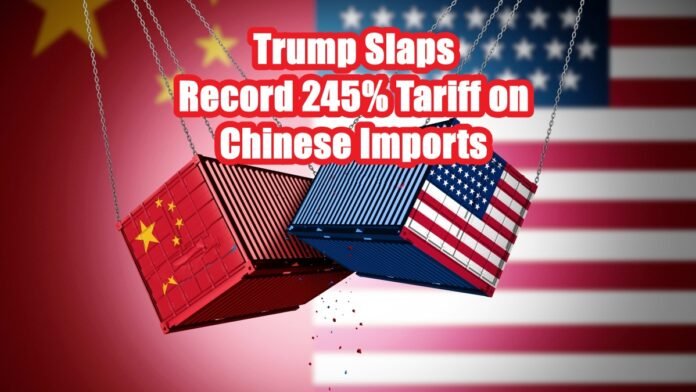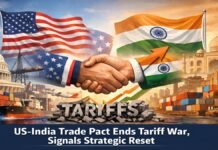
Key Points:
- The US has raised import tariffs on Chinese goods to a record 245%, the highest in history.
- The ongoing tariff war between the US and China is intensifying, fueling fears of a global trade crisis and recession.
- Both countries are rapidly increasing tariffs on each other’s products, impacting global supply chains and markets.
- Economists warn that escalating trade tensions could disrupt global economic growth and increase market volatility.
- The move is part of President Donald Trump’s aggressive trade policy aimed at pressuring China on trade imbalances and intellectual property issues.
New Delhi: The trade conflict between the United States and China has entered a new and more dangerous phase. In a dramatic escalation, US President Donald Trump has announced a historic increase in tariffs on Chinese imports, raising the import duty to an unprecedented 245%. This marks the highest tariff rate ever imposed by the US on any country, intensifying an already heated economic standoff.
What’s Behind the Latest Tariff Hike?
The US administration’s decision comes amid ongoing disputes over trade imbalances, intellectual property rights, and what Washington views as unfair Chinese trade practices. The Trump administration claims the new tariffs are necessary to protect American industries and jobs, but critics warn that such aggressive measures could backfire, raising costs for US consumers and businesses.
China Responds with Countermeasures
In response to the US action, China has also announced higher tariffs on a wide range of American goods, targeting key sectors such as agriculture, technology, and automobiles. This tit-for-tat escalation has rattled global markets and heightened concerns about the stability of international supply chains.
Impact on the Global Economy
Economists and market analysts are sounding alarms over the potential fallout. The rapid escalation in tariffs is expected to disrupt global trade flows, increase costs for manufacturers, and potentially trigger a slowdown in economic growth worldwide. Major stock markets have already shown signs of volatility, and multinational companies are bracing for further uncertainty.
Recession Fears Mount
With both the US and China digging in their heels, fears of a broader trade crisis and possible global recession are mounting. The International Monetary Fund and World Bank have both cautioned that prolonged trade tensions between the world’s two largest economies could have far-reaching consequences, affecting everything from commodity prices to employment rates across the globe.
What’s Next?
As the tariff war deepens, businesses and consumers around the world are watching closely for signs of a breakthrough or further escalation. Diplomatic efforts to resolve the dispute have so far yielded little progress, and the risk of continued economic disruption remains high.
“This is the highest tariff imposed in history so far. The fear of trade crisis and recession is increasing all over the world.”
The coming weeks will be crucial in determining whether the US and China can find common ground or if the world must brace for an extended period of economic turbulence.




















































